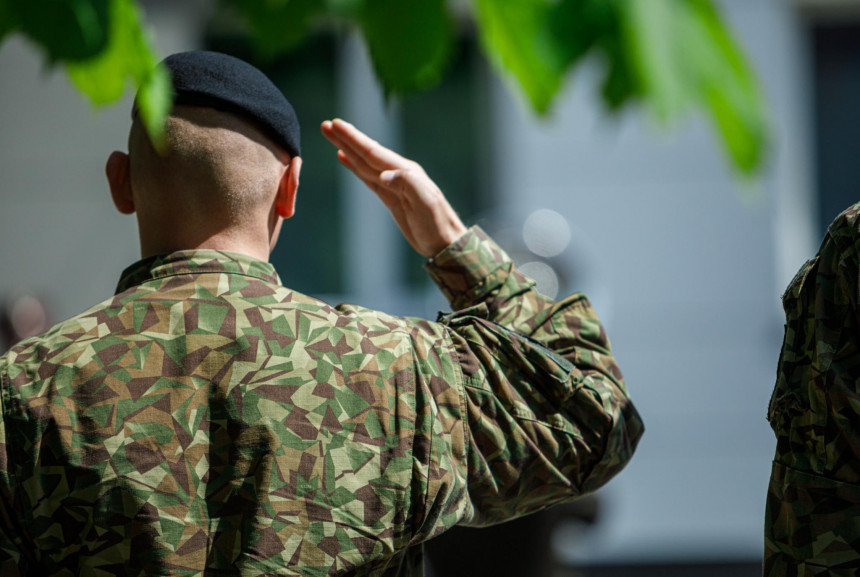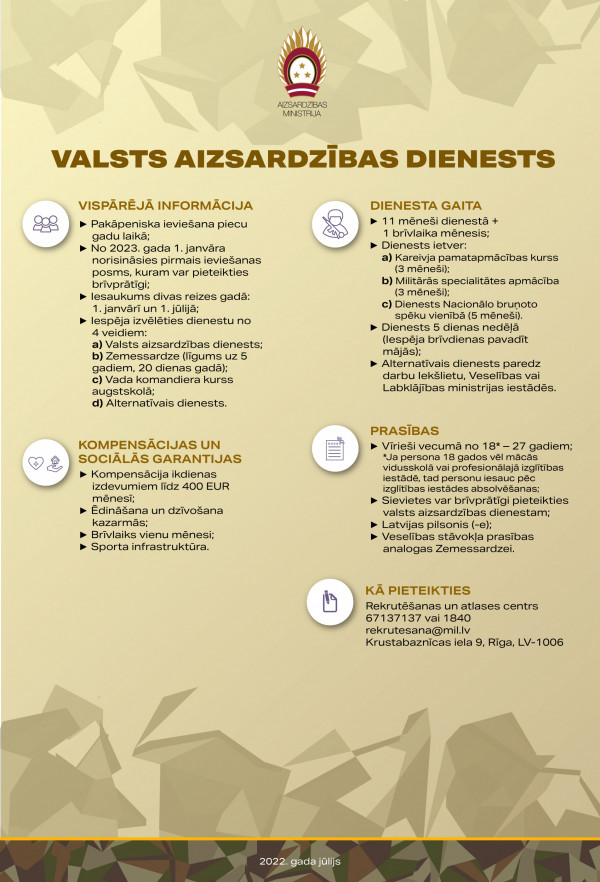National Armed Forces will start filling empty ranks on a compulsory basis

It may indeed be a coincidence that such news is being announced during the Prime Minister's vacation; it may also be a coincidence that the news is being announced right after the big NATO meeting in Madrid, and Latvia has not been reprimanded by Washington for demanding everything but failing to fill its already miniature army ranks and reserves with men. A long-overdue revolution in military recruitment policy has been announced.
At present, the defense of Latvia is a 100% voluntary undertaking. You want to work as a soldier, join the professional service of the National Armed Forces, you want to combine the defense of your homeland with other professional activities, join the National Guard and go to training or on a mission once or twice a month. Or don't, because it's all voluntary. And this voluntariness creates problems. There is a shortage of people in all five army brigades. Showing off their weapons to children and banner advertisements saying "Become a soldier!" at public sporting events and town festivals fail to recruit the numbers of soldiers and national guards needed. The army's internal reserves to respond adequately to the Russian threat are exhausted. This is why the Ministry of Defense has put forward a proposal to introduce a National Defense Service.
NAF forces to be doubled
This will be a completely new element in Latvia's defense system, which will initially still retain the principles of volunteering, moving within five years to compulsory universal conscription for men aged 18 to 27. The length of service will be 11 months. Conscription will take place twice a year. If the 11 months are not motivating or feasible, it will be possible to join the National Guard or to take a platoon commander's course at university, or to perform alternative service in the home affairs and health structures. But of course, the point of the exercise is not to produce orderlies, but fully-fledged soldiers, thus also producing a reserve army - citizens capable of fighting. The Ministry of Defense has set a target of 50,000 citizens in the National Armed Forces within five years, consisting of 14,000 active units, 16,000 National Guard units and 20,000 reserve units.
Climbing out of the hole
According to the latest opinion poll, 34% of the population is ready to defend Latvia in the event of a military invasion. 50% of men. However, the Ministry of Defense estimates that only 0.5% to 2% of Latvians have practical knowledge of warfare and are generally prepared for crises. This means that in the hour of crisis an absolute majority would currently rely on an absolute minority.
This needs to change. It should have been changed a long time ago. Eight years ago, when Russia invaded Ukraine.
In 2014, the National Armed Forces were brought to a critical situation by collective political irresponsibility. Professional service was reduced to a decorative minimum to be sent on international missions. No money, no equipment, no political support. The Ministry of Finance refused to accept even one new post to guard the Lielvārde military airfield, because - what is there to guard? But the formally largest territorial defense force was in even worse shape than the microscopic professional service.
Internal reserves exhausted
"The Latvian National Guard - in hopes and second-hand clothes", so Neatkarīgā reported at the time. We are capable of dying beautifully, but it would be better to survive unattractively. In the following years, defense funding improved rapidly. The Russian invasion of Ukraine served as an incentive, and NATO partners made it clear that to expect help, they had to invest in defense themselves. But it is only now that Latvia's defense planners have realized that the demographic hole cannot be filled with fancy uniforms, good equipment and 100% volunteerism. Eight years later, the small war has turned into a big war and Russia is threatening other countries on NATO's eastern flank. Including Latvia. The existing recruitment system has exhausted itself, and the action of the Ministry of Defense in promoting the idea of compulsory military service is logical and welcome. However, several nuances in the way the idea is being pursued are puzzling.
Commander's opinion
At the beginning of the year, there were no indications that the introduction of compulsory military service in the Armed Forces was planned. On the contrary, the army leadership, reacting to the public debate on the need for universal conscription, continued to justify why compulsory service should never be introduced. For example, here’s a quote from the NAF Commander, Lieutenant General Leonīds Kalniņš, in an interview on state television on February 1:
"My opinion is no. If we want to introduce high-tech defense capabilities into the Latvian defense system, then only the armed forces, consisting of professional soldiers and properly trained National Guard personnel, can provide them. Only this approach is valid for Latvia (…) If we have voluntarily built and later rebuilt our country, then we should defend it on a voluntary basis. If we now start forcing citizens to serve, we risk an even more negative reaction."
And here is Commander Leonīds Kalniņš’s view following this week's announcement by the Minister of Defense on the proposed establishment of a National Defense Service:
"My position is unchanged. A Latvian citizen must be prepared to defend his country on a voluntary basis, actively participating in professional service and in the National Guard. At the same time, we cannot ignore the main principle of the path we have chosen - a comprehensive national defense system - to involve as many Latvian citizens as possible in national defense in order to promote civic activism, resilience in crisis situations and the ability to perform various tasks related to national defense in the hour of crisis. Therefore, the initiative of the Minister of Defense is of course an opportunity to reach and prepare a much broader part of society for national defense."
War is just around the corner
Over time, the ministry and the army leadership have raised all sorts of counter-arguments to the introduction of universal conscription, some of them even demagogic - the cost of such service, negative associations with Soviet times, poor training, weakening of the National Guard, lack of instructors. On February 24, when Russia resumed its frozen hostilities on full scale and on a broad front, the ministry's opinion changed 180 degrees. Now it turns out that the defense ministry has been working for half a year on the documents necessary for the introduction of compulsory military service. It is strange that the ministry should come up with such a radical idea in public before a clear agreement has been reached in the coalition, and while the Prime Minister is still on holiday. This is probably an election tactic to put pressure on those partners and parties who doubt the need for such a service. But perhaps Latvia really cannot wait any longer for everyone to return from their vacations and survive the elections. The war is just around the corner and there may not be much time to spare.
*
For general information on the proposed structure of the National Defense Service, the course of service, the compensation and social guarantee mechanism, and the requirements for applicants, see this INFOGRAPHIC.
